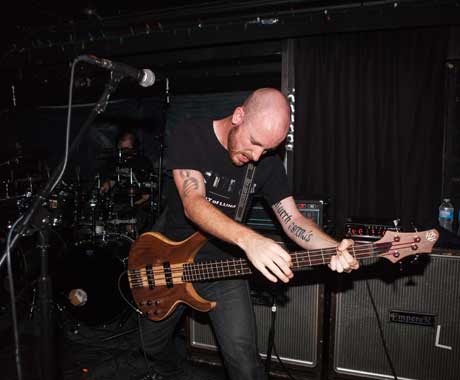The most prominent association with black metal in the minds of many is the aesthetic and performance style that evolved in the earliest, Scandinavian incarnation of the genre: Satanic imagery, corpsepaint, Bahamut and blood. It was a different kind of darkness that visited the Comfort Zone, the existential rather than the demonic. All three of these groups engage with intellectual decay and existential misery, engaging with a philosophical exploration of evil and negative potential, laying different shades of anguish against each other in exquisitely miserable juxtaposition.
Toronto, ON's own experimental black metal group Thantifaxath began the night with a set that was equal parts raw viciousness and delicate yearning. Drawn from their recent debut full-length, Sacred White Noise, the thunderous chords and unexpected song structures would unexpectedly give way to moments of shivering plaintiveness at the audience's most vulnerable moments, such as the stunning opening moments of "Lost In The Static Between Worlds." One aspect of their performance is the erasure of the ego; all three members don enveloping cloaks that cover their faces and bodies and refuse to identify themselves by name on any album materials, performing as a unified whole, obliterated by the music they are making.
New York City's Castevet performed a noisy, toothsome set of black metal shot through with charred post-hardcore. The progress from their 2010 debut Mounds of Ash to 2013's Obsian was one of increasing aggression that found them losing some of their gentle introspection and gaining a howling intensity. In a live setting, their music is texturally driven, changing shape and feel often and keeping the listener both intrigued and ill at ease. Like being carried along on an ocean of volcanic glass, Castevet are capable of both wounding and overwhelming.
New Zealand-based blackened technical death metal plague doctors Ulcerate are only now making it to North America to tour for their 2013 release Vermis, and as such, their set was almost entirely drawn from their newest material. However, it was unquestionably their older work that drew the strongest response from the crowd, such as "Dead Oceans" from The Destroyers of All.
Bleak and undulating, possessed of an eerie muscularity, the set balanced anguish and violence. Paul Kelland's vocals seemed to be driven out of a black furnace, delivered with an intensity all the more surprising because of his neat, aquiline features and almost serene expression (when his face was not contorted with screaming). Eviscerating and merciless, their set was dizzying and exhausting, demanding everything from a witness.
Toronto, ON's own experimental black metal group Thantifaxath began the night with a set that was equal parts raw viciousness and delicate yearning. Drawn from their recent debut full-length, Sacred White Noise, the thunderous chords and unexpected song structures would unexpectedly give way to moments of shivering plaintiveness at the audience's most vulnerable moments, such as the stunning opening moments of "Lost In The Static Between Worlds." One aspect of their performance is the erasure of the ego; all three members don enveloping cloaks that cover their faces and bodies and refuse to identify themselves by name on any album materials, performing as a unified whole, obliterated by the music they are making.
New York City's Castevet performed a noisy, toothsome set of black metal shot through with charred post-hardcore. The progress from their 2010 debut Mounds of Ash to 2013's Obsian was one of increasing aggression that found them losing some of their gentle introspection and gaining a howling intensity. In a live setting, their music is texturally driven, changing shape and feel often and keeping the listener both intrigued and ill at ease. Like being carried along on an ocean of volcanic glass, Castevet are capable of both wounding and overwhelming.
New Zealand-based blackened technical death metal plague doctors Ulcerate are only now making it to North America to tour for their 2013 release Vermis, and as such, their set was almost entirely drawn from their newest material. However, it was unquestionably their older work that drew the strongest response from the crowd, such as "Dead Oceans" from The Destroyers of All.
Bleak and undulating, possessed of an eerie muscularity, the set balanced anguish and violence. Paul Kelland's vocals seemed to be driven out of a black furnace, delivered with an intensity all the more surprising because of his neat, aquiline features and almost serene expression (when his face was not contorted with screaming). Eviscerating and merciless, their set was dizzying and exhausting, demanding everything from a witness.
